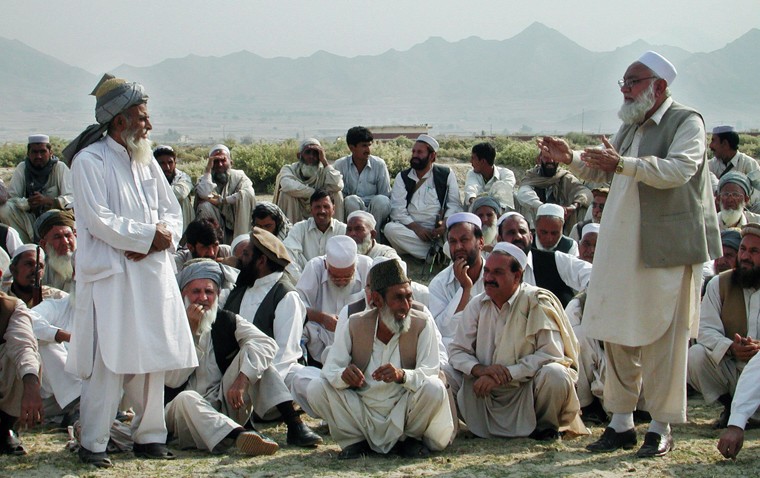
Draft bill of 22nd Amendment has triggered a new debate on Fata reforms

In the first week of October, a draft bill for 22nd Amendment in the constitution will be presented in the National Assembly, seeking reforms in Fata’s administration. The said bill undertakes the merger of Fata with Khyber Pakhtunkhwa’s Provincially Administered Tribal Areas (PATA). Although stakeholders are unanimous in mainstreaming Fata, they are not only poles apart on the question of how to integrate the tribal track but the absence of any local input renders the whole scheme almost meaningless.
Proposals regarding the initiation of reforms in Fata are flowing in from all quarters. There is no consensus of opinion when it comes to reforming the tribal areas though. Voices range from seeking the (1) merger of the region into Khyber Pakhtunkhwa’s PATA to (2) making it a fully fledged province and to (3) a new arrangement in the shape of elected council of Fata to (4) mere deletion of clause 7 of article 247 to extend the jurisdiction of superior courts to Fata.
Nevertheless, the first practical step, premature though, came from Fata parliamentary leader MNA Shah Jee Gul Afridi who has submitted a draft constitutional amendment in the National Assembly secretariat proposing 22nd Constitutional Amendment Act, 2015, which aims at integrating Fata into PATA. Signed by just four MNAs, the proposed amendment requires two-third majority for its approval.
I interviewed Senator Usman Kakar in his capacity as chairperson Functional Committee on Problems of Less Developed Areas which also includes Fata for his position on Fata reforms. He dwelt upon the concept of elected council for Fata and threw his weight behind the idea. "There should be an elected jirga on the level of each tribal agency duly elected on the basis of adult franchise vested with legislative, executive and judicial powers," stated Kakar. "At the pinnacle should be the masharano jirga (council of elders) comprising elected representatives from each of the seven agencies headed by a chief executive duly elected by the council of elders," he stressed.
"Similarly, Fata should have an elected governor who must come from the region. Fata should not be merged into either PATA or Khyber Pakhtunkhwa," he continued. "The overall development of tribal areas requires introducing socio-economic, political and educational reforms on emergency footing. Nevertheless, for any reform in the tribal areas, qabaili ulas (tribal people) must be consulted," he concluded.
Which one of the four choices relating to reform should take precedence in the tribal areas in principle should depend upon what lies at the heart of issue. Although Fata is a backward area in almost every sense of the word, religious militancy in the tribal areas is a primary concern. The weak state or the informal state is mainly responsible for engendering militancy in the tribal landmass. There are a number of options for a viable way of beginning reforms in Fata.
What are the available options.
(1) The creation of a new province constituting all the seven tribal agencies and the adjacent frontier regions is the best option among the available choices. Doing so will not only bring the tribal areas under firm state control, it will also help reduce the paranoia among certain quarters that Pashtun nationalists had any allegedly mala fide intention of conspiring against the state especially at a time when voices for integration come from nationalist quarters!
(2) The inclusion of Fata in Khyber Pakhtunkhwa’s settled districts is the second best option. It will militate against weak state writ on the one hand and will help speed up the pace of modernisation in the tribal areas.
(3) The merger of Fata into PATA will least integrate the former into the state apparatus though it is better than no integration at all.
(4) The mere deletion of clause 7 of article 247 will at least extend the jurisdiction of high court and Supreme Court to Fata. Even this last option for reforming tribal areas is better than the idea of no reform at all in the tribal hinterland.
The proposed 22nd Amendment is a premature idea, which will be defeated in the National Assembly in all probability. Apart from everything, any reform scheme must give priority to local voices. Any imposition from the above will have far reaching adverse consequences.
A referendum seeking opinion from tribal folk on the above four or five choices should be held within a specified six month period once the IDPs are honourably returned to their respective tribal agencies. Within these six months all political groups/parties should have the opportunity to mobilise people along these choices. In the light of the result, parliamentarians from Fata should move an amendment in the constitution backed by other political parties meant to introduce reforms in Fata.
Any progress made against religious militancy under the NAP is temporary until solidified by the mainstreaming of tribal areas. There is also an urgent need of ending the tribal status of PATA accompanying its complete merger into Khyber Pakhtunkhwa. Fata and PATA make Pakistan’s weakest links in the country’s national security at least since early 1990s. The inevitable need is to restore the writ of state not only in Fata and PATA but also elsewhere in the country.